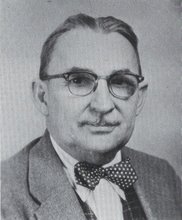Dear Dr Knowledge:
I love Christmas carols. What can you tell me about my favorite carol, "Oh, Little Town of Bethlehem"?
G. K. Chesterfield
Oh Little Town of Bethlehem
Curiously this song had no Biblical connotation in its original manifestation. The Bethlehem referred to then was Bethlehem, PA. The song, written by Hap Silverstein and debuted in the Broadway production of "Annie on the Town" in 1939, was first sung by a young woman from small-town Pennsylvania, Annie (played by the voluptuous Ana Hovana) who, having recently moved to New York City, enjoys the attention of the sophisticated and worldly Rodney while being pursued by the earnest yet slightly dull Johnny, all as she tries to keep her married, oversexed boss, Mr Bielefeld (played to rave reviews by the legendary Broadway comedian Jackie Stewart), on a string. In the song, Annie comments wryly on her life's complications and with tongue firmly in cheek pines for a simplicity she left behind. The song was a typical send up of small-town life written for the amusement of big city audiences, containing such lines as, "The traffic moves so slow there," and "the people are so square." Audiences howled over it as long as the show ran.
With the country entering the war in 1941, however, its songwriters and creative talents were called on to aid the war effort. Almost overnight a whitewash of respectability was slapped on over the tawdry lights of Broadway. In cooperation with the Roosevelt administration in what was labeled Operation Holier Than Thou, Broadway writers agreed to switch production to exclusively homely, Christian, and smalltown-celebrating songs, in order to convince American fighting troops from the hinterlands that their leaders were just as virtuous, Bible-thumping, and apple-pie-eating as they ought to be. As part of this plan and with "Annie" now closed, the slightly stale but still serviceable "Bethlehem" was reintroduced to the public, with its gawking and guffawing yokels, however, replaced by pious shepherds, its sleepy downtown an Eastern village, and its narrow and vindictive town fathers now wise Oriental kings. It was recommissioned as a timeless, pious Christmas classic, and the public, notoriously short memoried, accepted this as gospel, and the rest is musical history.
Dear Dr Knowledge:
That's interesting. Now what about "Joy to the World"?
Rev. Henry Witherspoon
Joy to the World
Another example of the inestimable debt we carol listeners owe amateur songwriters, "Joy to the World" was written by a humble bellhop named Guisepie Verdini. Far from being hindered by his lack of formal musical training, Verdini positively benefited from it. For undoubtedly, the most charming aspects of the song are when Verdini intermixes the celebration of Christ's birth with rich bellhopian imagery. Take, as an example, the truly sublime line: "Let every heart prepare him room." Obviously no "professional" composer would try and sneak such a clinker past the public. Yet it a credit to Verdini's humble genius that the line works.
Explaining his inspiration for this line, Verdini wrote in his autobiography Mya Life ina ze Muzic (Buenos Aires, 1896) [translation mine]: "One time I a-think, as I'm a-cleaning uppa de rooms and carrying uppa de bags, what if de Lord, he show up here ata dis hotel. Well, the manager, he woulda say to me, 'Guisepie, Go prepare the Lord him room. He's a tired. Want to lie down.' Something alike dat he would say. And I woulda say 'Yes, I willa prepare the Lord him room.' Anda that's awhere I getta the idea to a-write this songa."
In fact, Verdini's original draft of the carol was riper with bellhopian imagery. For example, in place of what would eventually become, "The nations prove the glory of his righteousness," he had originally written, "The Lord wants an early wake up call." And then "Let Heaven and Nature sing," had originally been, "Make sure and make his phone ring." Unfortunately, one by one Verdini was persuaded by so-called competent musical authorities to remove these lines and replace them with blander, more conventional imagery, to the detriment of the work, in my opinion. In fact, it is staggering to note that the glory that shines through this carol is only a fraction of what was originally invested in it by its author, the great bellhop caroler, Guisepie Verdini.
Monday, December 4, 2006
Subscribe to:
Post Comments (Atom)

No comments:
Post a Comment